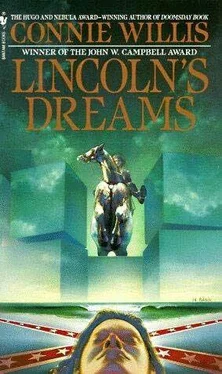Connie Willis - Lincoln’s Dreams
Здесь есть возможность читать онлайн «Connie Willis - Lincoln’s Dreams» весь текст электронной книги совершенно бесплатно (целиком полную версию без сокращений). В некоторых случаях можно слушать аудио, скачать через торрент в формате fb2 и присутствует краткое содержание. Город: New York, Год выпуска: 1992, ISBN: 1992, Издательство: Bantam Books, Жанр: Фантастика и фэнтези, на английском языке. Описание произведения, (предисловие) а так же отзывы посетителей доступны на портале библиотеки ЛибКат.
- Название:Lincoln’s Dreams
- Автор:
- Издательство:Bantam Books
- Жанр:
- Год:1992
- Город:New York
- ISBN:978-0553270259
- Рейтинг книги:3 / 5. Голосов: 1
-
Избранное:Добавить в избранное
- Отзывы:
-
Ваша оценка:
- 60
- 1
- 2
- 3
- 4
- 5
Lincoln’s Dreams: краткое содержание, описание и аннотация
Предлагаем к чтению аннотацию, описание, краткое содержание или предисловие (зависит от того, что написал сам автор книги «Lincoln’s Dreams»). Если вы не нашли необходимую информацию о книге — напишите в комментариях, мы постараемся отыскать её.
presents the story of a young historical researcher who is being pulled deeper and deeper into the time of the Civil War.
Lincoln’s Dreams — читать онлайн бесплатно полную книгу (весь текст) целиком
Ниже представлен текст книги, разбитый по страницам. Система сохранения места последней прочитанной страницы, позволяет с удобством читать онлайн бесплатно книгу «Lincoln’s Dreams», без необходимости каждый раз заново искать на чём Вы остановились. Поставьте закладку, и сможете в любой момент перейти на страницу, на которой закончили чтение.
Интервал:
Закладка:
Connie Willis
LINCOLN’S DREAMS
To Courtney and Cordelia
Special thanks to my research assistants, the Smiths—Brooke and Karolyn, Brien and Julie—for wandering among the tombstones of Fredericksburg and Arlington, asking questions and taking notes, searching for clues.
It may be that life is not man’s most precious possession, after all. Certainly men can be induced to give it away very freely at times, and the terms hardly seem to make sense unless there is something about the whole business that we don’t understand. Lives are spent for very insignificant things which benefit the dead not at all—a few rods of ground in a cornfield, for instance, or temporary ownership of a little hill or a piece of windy pasture; and now and then they are simply wasted outright, with nobody gaining anything at all.
Bruce Catton, Mr. Lincoln’s ArmyFOREWORD
While I was working on Lincoln’s Dreams , any number of people asked me why I was writing a book about the Civil War, but no one at all asked me why I was writing a book about dreams. Instead, when I told them what the book was about, they began telling me about dreams they had had, as if I could tell them what they meant.
I had no idea. I have no idea what any dreams mean. All the latest research seems to indicate that they don’t mean anything—that they are nothing more than the nervous system’s charwoman, tidying up after the day’s events, taking out the trash. And that makes very good sense. (Why else would we dream about empty creamer packets that steal a parakeet?) But something in us rebels at the idea that they’re the day’s detritus, because dreams so obviously mean something.
Freud thought so, too. He wrote his dreams down in painstaking detail (they are as ridiculous as ours—full of flower monographs and false teeth) and pored over them, trying to decipher their meaning. He decided they were dispatches from our unconscious: longing sighs and murmured memories and cries for help, all sent in a complicated code.
And that seems logical, too, until it comes to the deciphering. (“The creamer packets clearly represent your yearning for your mother’s breast…”) Because it’s not a code, it’s another language. And their images can’t be reduced to symbols. Dreams are something more, something else.
Abraham Lincoln dreamed his own death. He heard the sound of crying and asked the guard, “Who is dead in the White House?” and the guard said, “The President.” And it’s perfectly clear what that dream meant. You don’t need a codebook to tell it’s a warning. Yet I find myself puzzling over it, and over that other dream of his, the one he dreamed “before every significant event of the war,” the one he dreamed the night before he died. In that dream, he was in a boat, drifting toward an unknown shore, and you don’t need Freud for that one either.
Or if you insist on the charwoman theory, it is scarcely unusual that death was on his mind—there was at least one assassination attempt a week, and he had already heard the sound of crying in the White House when Willie died. And yet, in spite of all this logic, I find them staying with me like a dream, the code impossible to decipher, troubling me, haunting me.
As the Civil War haunts me. In the first part of Lincoln’s Dreams , Jeff is offered a job researching the long-term effects of the Vietnam War. He turns it down. “I’m busy studying the long-term effects of the Civil War.” And I guess that’s what I was doing, too, writing this book. Because the Civil War isn’t over. Its images, dreamlike, stay with us—young boys lying face-down in cornfields and orchards, and Robert E. Lee on Traveller. And Lincoln, dead in the White House, and the sound of crying.
The Civil War disturbs us, all these long years after, troubling our sleep. Like a cry for help, like a warning, like a dream. And we pore over it, trying to break the code, its meaning just out of reach.

CHAPTER ONE
They bred such horses in Virginia then, Horses that were remembered after death And buried not so far from Christian ground That if their sleeping riders should arise They could not witch them from the earth again And ride a printless course along the grass With the old manage and light ease of hand.
Stephen Vincent BenetT raveller died of lockjaw two years after Robert E. Lee died. I looked that up one day in February, the day I went out to see where Abraham Lincoln’s son Willie had been buried. I had been looking for the grave for over a year, and when I finally found it in a biography of Mary Todd Lincoln, I ran out of the library still carrying the book. It set off an alarm, and one of the librarians came out on the steps and shouted after me, “Jeff, are you all right? Jeff!”
It was snowing hard that day, a wet spring snow. It took me nearly an hour to drive out to the old cemetery in Georgetown. I don’t know what I thought I’d find, some clue maybe to where Annie was and what had happened to her, some message that would tell me what had happened to all of them, Tom Tita and Ben and the rest of the soldiers who had died in the Civil War and were buried together under granite squares no larger than a scrap of paper.
But there wasn’t anything there, not even Willie Lincoln’s body, and I went back to Broun’s house and got out Freeman’s four-volume biography of Lee and tried to find out what had happened to Traveller.
As with everything else that had happened, there were both too many clues and not enough. But eventually I found out what I needed to know, the way I had found out where Willie had been, the way I had found out what was causing Annie’s dreams. After all, that was what I was good at, wasn’t it, looking up obscure facts? Traveller had lived two years. He had picked up a nail and gotten lockjaw. They had had to shoot him.
I met Annie two years ago, the night of Broun’s press reception. The reception was supposed to be an advance publication party for Broun’s twelfth novel, The Duty Bound , with bound galleys passed out to the press, but there weren’t any galleys. There wasn’t even a finished book.
The press reception had been scheduled for the last week in March, but at the end of February Broun was still fiddling with the copyedited manuscript, making changes and then changing the changes, and a week before the reception I was back in West Virginia, trying to find out exactly when Lee had bought Traveller.
It was a detail that didn’t matter one way or the other to the book, since Lee had definitely been riding Traveller at Antietam in September of 1862, but it was the kind of thing Broun had been fussing over the entire book, and it worried me.
He was having all kinds of trouble with The Duty Bound . He usually turned out his Civil War novels like clockwork: proposal to outline to manuscript to corrected galleys, which was why his publisher, McLaws and Herndon, had gone ahead and scheduled this reception before they had the copyedited manuscript back.
I might have done the same thing. In the four years I’d been doing research for Broun, he’d never missed a deadline. But with The Duty Bound , he hadn’t made a deadline yet, and when I called him from West Virginia he was still making major changes.
“I’m thinking of adding a chapter at the beginning of the book, Jeff,” he said. “To explain why Ben Freeman enlists.”
Читать дальшеИнтервал:
Закладка:
Похожие книги на «Lincoln’s Dreams»
Представляем Вашему вниманию похожие книги на «Lincoln’s Dreams» списком для выбора. Мы отобрали схожую по названию и смыслу литературу в надежде предоставить читателям больше вариантов отыскать новые, интересные, ещё непрочитанные произведения.
Обсуждение, отзывы о книге «Lincoln’s Dreams» и просто собственные мнения читателей. Оставьте ваши комментарии, напишите, что Вы думаете о произведении, его смысле или главных героях. Укажите что конкретно понравилось, а что нет, и почему Вы так считаете.












